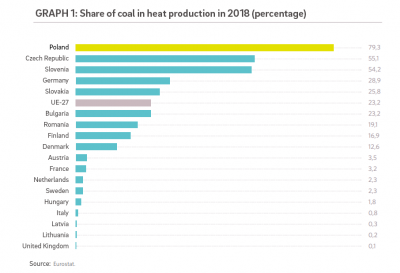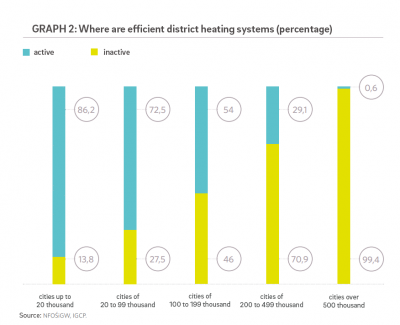Poland – as one of the implementing countries of the RES-DHC project – has Europe’s second largest district heating market. Currently, there are around 400 district heating networks in Poland, supplying heat to approximately 16.5 million residents.
80 % of the network is still powered using hard coal. The second edition of the “Ciepłownictwo Powiatowe” (‘district heat’) programme was recently launched to speed up the decarbonisation of district heating in Poland.
The management boards of many Polish heating plants are facing difficult but necessary investment decisions, since failure to comply with EU requirements will result in major financial consequences. In order to improve air quality and meet EU requirements, the National Fund for Environmental Protection and Water Management has launched the second edition of the “Ciepłownictwo Powiatowe” programme. The total budget of the programme stands at PLN 500 million, and the programme’s initiators decided to adjust its thresholds to invite entities with less investment capital, aiming to reach more investors. The required stake of local government units in the applicant’s company has been reduced to 50 %, and the amount of subsidy has been raised to 50 %. Investments worth PLN 0.5 million to 300 million are eligible for co-financing and the minimum loan amount has been reduced.
It is an important step towards change, as up until now the district heating sector had to finance investments mainly using its own resources. In 2019, the district heating sector invested PLN 3.5 billion (data from the Energy Regulatory Office – URE 2020). This is, among others, due to the sector’s reluctance to apply for financing. The rising needs related to the necessary modernization of heating plants and reducing emissions will result in growing demand for co-financing in the coming years.
“The Polish heating sector needs long term action such as investment support measures”, says Mariusz Majkut, CEO of SEC and CEO of E.ON edis energia. “The availability of more financial resources can help in decision-making on investments, reducing their risk. I am convinced that from the point of view of the recipient, these decisions are simply necessary.”
According to Polityka Insight’s report entitled “HEAT FOR CHANGE. How to modernize the district heating sector in Poland?”, the road to meeting EU expectations is a long and winding one. The reform’s horizon should not be restricted to 2030, and in order to achieve climate neutrality by 2050, the sector already has to plan the next step in its evolution. Naturally, it will be impossible without adequate support from the government, such as the „District Heating” programme mentioned above, all the more so that the smaller is the city, the bigger is the problem with heat. As many as 80 % of small heating systems are inefficient. This aggravates the gap between large agglomerations with cheap heat and small towns where the residents have to pay even more for their heating. This is why the amendments to the programme are to effect real change for those heating plants.
Even though the programme’s administrators do not provide for any minimum share of clean energy which would have to be met following modernization, the programme can still help companies take the necessary actions, so as to make the 2030 and 2050 deadlines feasible for Poland.
Text and pictures: Szczecinska Energetyka Cieplna Sp. z o.o. (SEC)



